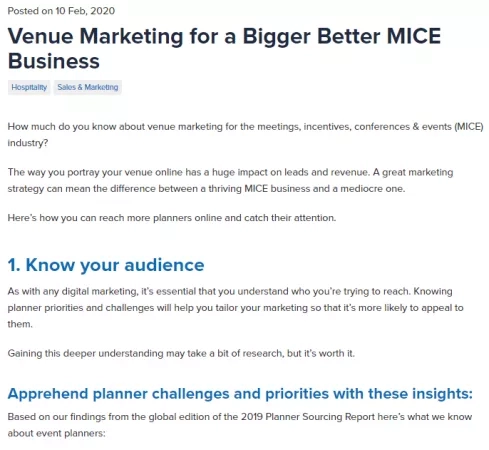It doesn’t need to be said that these are challenging times for the hospitality industry. Recent societal change due to COVID-19 has greatly impacted leisure, meetings and events (MICE) and corporate travel business. Nevertheless, there are methods, such as search engine optimisation (SEO) marketing that will help you maintain your website traffic and prompt new leads. Hotel SEO isn't as complicated as you might think.
The state of hospitality may dishearten you, but with so many businesses all around the world worrying for their future, staff and profit, we need to club together. It’s not a time to panic, but to come up with effective, cost-efficient ways to get your brand out there and remain top of mind.
We need to find solutions that will not only keep us going during tough times, but also aide recovery. When the time comes, we need to have the tools necessary to get us back into the game.
SEO marketing is where we start
As more and more people start to work remotely, your digital presence should be a first priority. We’ve already seen that event planners aren’t cancelling events; they’re moving them to later in the year.
People will be using this time of isolation and social distancing to browse the web, read content, search for solutions and source properties for future events. That means that you need to make your business easily findable and top of search engine results pages when people start booking events and corporate travel for later in the year.
SEO marketing is one such way to take advantage of this growing trend.
What is SEO?
Put simply, SEO marketing is the practice of making your website search engine friendly – resulting in:
- Higher ranking pages,
- Increased quality of website traffic
- Increased quantity of website traffic
- For hotels, bookings
This can be done through optimising copy, reducing the size of images and editing meta-data. But we’ll get into the nitty-gritty of how you, a hotelier, can do this for your website in a minute.
Why should my hotel focus on SEO marketing at a time like this?
As we mentioned, SEO is a fantastic way of generating website traffic and quality leads. It can help you beat the competition and get your webpages to that prized no.1 spot on Google.
Organic search, similar to paid, is a competitive space, and if you neglect SEO, you could find yourself falling behind. Hotels that are on-top of their SEO will rank higher and you might fall to the dreaded page 2.
The good news: unlike paid search, SEO marketing is significantly less costly than Facebook retargeting or Promoted Instagram Stories.
Follow these simple tips and you’ll be on your way to creating an SEO strategy for your hotel or venue that works.
Tip #1: Keywords matter
Your starting point will always be keywords. What are your buyers searching online? You need to understand what they search for in Google, how they phrase questions and which words they are using.
Say for example, you are a hotel in London – when someone sources a venue they might search:
- Hotels in London
- Meeting space London
- Hotels in London Bridge
- Informal meeting space
- Conference venues hire London
This process can be done with a variety of online tools, some free, some not.
Free SEO tools:
Paid SEO tools:
You’ll want to create a list of keywords with the highest search volume and rank them. Remember that the higher the search volume, the higher the competition, so it’s sometimes best to start with the middle ground.
Then, apply these keywords to any content you produce, whether it be your webpages, blogs or any campaigns you may run.
You also need to consider which keywords are working for you and which aren’t. For example, some keywords may bring tonnes of traffic to your site, but very little of it is converting. Your aim should be to use keywords that result in the most high-quality, high-converting traffic possible.
A good tip for dealing with keywords: don’t overdo it or search engines will penalise you for keyword stuffing. Sounds like a tricky thing to get right, especially as Google has not said if it affects ranking or not. But if you can stick to a keyword density of 1 – 2% you should be in the clear. That means for example, if you have a 1,500 word blog, the keyword should be found at least 20 – 30 times. You can find a good tool to check density here.
Tip #2: Meta tags matter
Google doesn’t just crawl the copy of your content, it also looks at your meta tags, I.e. snippets of information that describe the content on your webpage. These pieces of information are called metadata. It’s important in order for:
- Search engines use this to understand your content
- Work out the quality and usefulness of the content
- To understand for which search terms to show the content
- Where to rank the content on the search engine results page
Editing and optimising your meta tags is simple and most content management systems (CMS), such as Hubspot, WordPress or Drupal, offer fields in the backend of your web and blog pages in which to input your tags.
While not all meta tags will affect your SEO performance, there are a couple you should never ignore (a couple of these can be handled by your web designer). They include:
Meta content type
(Your web designer should know what’s best here)
Title
While this may not start with the word “meta”, it is vital to your SEO efforts. Your titles should be unique, simple and include the keyword you’ve chosen for that particular page.
Meta description
When you search on Google, a meta description is the tag that determines the copy you see below the titles of the results. Not only does this help Google when deciding where to rank you, but it also helps users decide whether they think your content is worthy of their time. Make it count!
Viewport
Again, your web designer should know about this, but it’s vital for great performing mobile pages. If you’re feeling techy, you can learn more about viewports here.
This is a tiny guide to meta tags, but if you would like to learn more, Moz has a brilliant guide here.
Tip #3: Make it easy for search engines
When search engines crawl your webpages, it’s looking to understand your content. You can give them a helping hand by breaking it up with header tags. These are vital to your SEO. Again, these can be found in the HTML coding of your page, but most CMSs provide simple ways to class your headers.
So, lets break down the headers:
- H1: Your H1 should be the main title of your page. That’s the title that will appear on a search engine result page
- H2: These should be your subheaders
- H3, H4, H5 etc: These are any other headers that fall beneath your subheaders.
Here’s an example of header tags. The title is H1, the second is H2 and the third is H3 as it falls within the “1. Know your audience” section:
Ensure your H1 are always original, and not duplicated, as this can damage your SEO.
A small tip from us: the more you can break up your content with headers, the easier it will be for the search engine to understand what the page is all about. It also improves readability for users, so ensure you’re using them well and correctly. Take this blog post as an example when it comes to headers.
Tip #4: Update, update, update
According to Neil Patel, SEO guru, updated content is the best way to double your traffic.
Search engines love fresh content and will favour new pages above old, untouched content. The best way to do this is by publishing evergreen content, I.e. content that doesn’t become outdated and stands the test of time.
How to update your content:
- Fix grammar and spelling mistakes
- Show Google that your content is fresh
- Improve accuracy
- Remove broken links and add fresh, better ones
- Update or include multimedia
- Optimise keywords
- Share and promote again
- Repurpose your content
By doing this, not only will you improve user experience, but you’ll also be increasing the amount of times a search engine crawls your site. This will improve your chances of appearing higher in search results.
Tip #5: How long do your pages take to load?
Users dislike pages that take more than a few seconds to load, and so do search engines. Google, in fact, has made it an actual ranking factor when it comes to SEO. Slow loading webpages will actively hurt your search engine ranking.
10 seconds doesn’t seem like a long time, but when it comes to page speed, that’s a very long time.
Things that impact the load speed of your pages include a sites server, page file size and image compression. Most of these things you won’t have to worry about and can be handled by your web designer.
Take control of the image compression aspect:
Images on a webpage usually take up 50-90% of its size. That’s why it’s important they are compressed. There are plugins that will help you with this. For example, if your site is on WordPress, WP Smush will automatically compress your images added to the library.
There are many other useful tips here, again, if you’re feeling techy, or if you’d like a deeper understanding of SEO.
Conclusion
Keep calm and carry on is more relevant than ever nowadays, especially when it comes to your digital presence. SEO marketing is a cheap and incredibly effective method of staying top of mind and being there when your buyers are ready to source for venues again.
Use these hotel SEO tips to win more business!
Next up, discover how to drive MICE business with content marketing.






